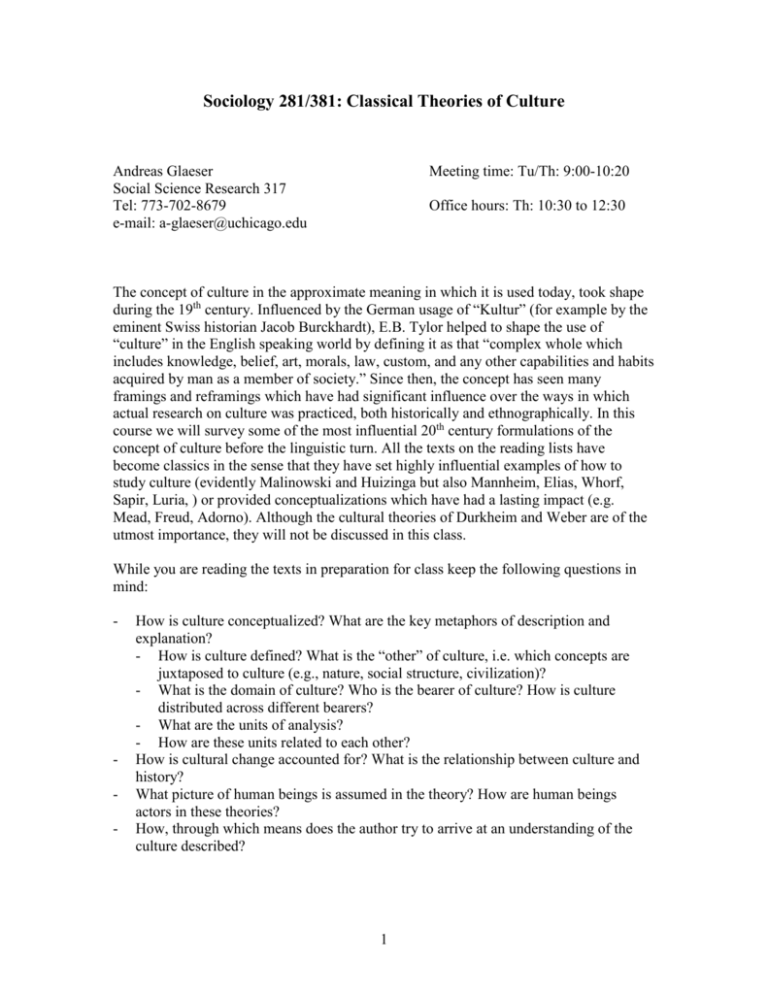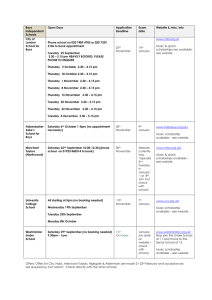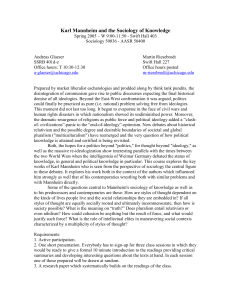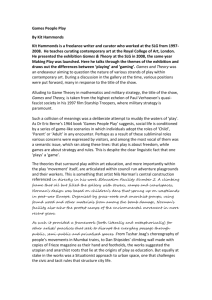Sociology 281/381: Classical Theories of Culture
advertisement

Sociology 281/381: Classical Theories of Culture Andreas Glaeser Social Science Research 317 Tel: 773-702-8679 e-mail: a-glaeser@uchicago.edu Meeting time: Tu/Th: 9:00-10:20 Office hours: Th: 10:30 to 12:30 The concept of culture in the approximate meaning in which it is used today, took shape during the 19th century. Influenced by the German usage of “Kultur” (for example by the eminent Swiss historian Jacob Burckhardt), E.B. Tylor helped to shape the use of “culture” in the English speaking world by defining it as that “complex whole which includes knowledge, belief, art, morals, law, custom, and any other capabilities and habits acquired by man as a member of society.” Since then, the concept has seen many framings and reframings which have had significant influence over the ways in which actual research on culture was practiced, both historically and ethnographically. In this course we will survey some of the most influential 20th century formulations of the concept of culture before the linguistic turn. All the texts on the reading lists have become classics in the sense that they have set highly influential examples of how to study culture (evidently Malinowski and Huizinga but also Mannheim, Elias, Whorf, Sapir, Luria, ) or provided conceptualizations which have had a lasting impact (e.g. Mead, Freud, Adorno). Although the cultural theories of Durkheim and Weber are of the utmost importance, they will not be discussed in this class. While you are reading the texts in preparation for class keep the following questions in mind: - - How is culture conceptualized? What are the key metaphors of description and explanation? - How is culture defined? What is the “other” of culture, i.e. which concepts are juxtaposed to culture (e.g., nature, social structure, civilization)? - What is the domain of culture? Who is the bearer of culture? How is culture distributed across different bearers? - What are the units of analysis? - How are these units related to each other? How is cultural change accounted for? What is the relationship between culture and history? What picture of human beings is assumed in the theory? How are human beings actors in these theories? How, through which means does the author try to arrive at an understanding of the culture described? 1 Requirements: 1. Papers: Graduate students and fourth year students: Final 15 page paper (double space, 1 inch margins, 12 point font) which draws substantively on the readings for this class but also goes beyond the readings for this class. Such a paper can be a theoretical discussion, for example a systematic comparison of several authors (especially between post linguistic turn theorists or Durkheim and Weber and the authors on the list), a research proposal for your own cultural research or an empirical piece which fits into your own research agenda. Third year students and lower: Final take home examination (dates to be arranged with the group). If you would also rather like to write a final paper please see me. 2. Grade composition: Graduate students and fourth year undergraduates: Your final grades will be based on your final paper (60%) and your general class participation (40%). Notes on the reading list: *books on Regenstein reserve and in Seminary Coop store +you can borrow a copy from my mailbox in the department Meeting and reading schedule: Thursday, January 3 Introduction, organization of class I. The Historiography of Culture: Johan Huizinga Tuesday, 8 January *Johan Huizinga: The Autumn of the Middle Ages: Chapters 1, 2, 3 Thursday, 10 January *Johan Huizinga: The Autumn of the Middle Ages: Chapters 9, 10, 11, 14 *Johan Huizinga: Homo Ludens 2 II. Functionalist Ethnography: Malinowski Tuesday, 15 January *Bronislaw Malinowski: Argonauts of the Western Pacific, intro and chs. 2,3,10 Thursday, 17 January *Bronislaw Malinowski: Argonauts of the Western Pacific, chs. 12,14,17,22 Excursion: Culture and Nature Tuesday, 22. January +Franz Boas: Human Faculty as Determined by Race (A Franz Boas Reader edited by George Stocking, Chicago University Press) +Margret Mead: Sex and Temperament in Three Primitive Societies, parts III and IV Thursday, 24 January +Arnold Gehlen: Man, his nature and his place in the world III. The Sociology of Knowledge: Mannheim Tuesday, 29 January *Karl Mannheim: The Problem of a Sociology of Knowledge (in From Karl Mannheim) Thursday, 31 January *Karl Mannheim: The Problem of Generations & Competition as a Cultural Phenomenon (in From Karl Mannheim) IV. Culture as Personality Tuesday, 5 February *Ruth Benedict: Patterns of Culture, chs. II, III, IV, VIII *Edward Sapir: Language, Culture and Personality 3 IV. Linguistic and Cognitive Approaches: Whorf, Luria, Vygotsky Thursday, 7 February *Benjamin Lee Whorf: Language Thought and Reality, pp. 134-159; 207-245 Tuesday 12 February *Aleksandr Luria: Cognitive Development, pp. 3-48; 100-134 Thursday 14 February *Vygotsky: Mind in Society, pp 19-119 V. Psychoanalysis Tuesday February 19 *Sigmund Freud: Beyond the Pleasure Principle Thursday, 21 February *Sigmund Freud: Culture and its Discontents VII. Historical Figurations Thursday, 26 February *Norbert Elias: The Civilizing Process Tuesday, 28 February *Norbert Elias: The Civilizing Process Thursday, 5 March *Mikhail Bakhtin: Rabelais and His World 4








